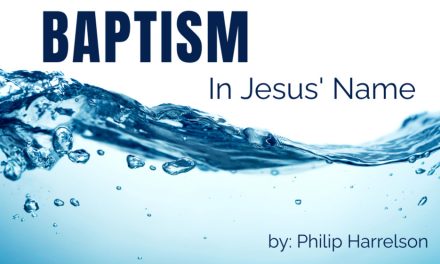Romans 5:20 is a well used verse with a lot of power. Moreover the law entered, that the offence might abound. But where sin abounded, grace did much more abound:
“More” is an interesting word. The literal definition is “a greater or additional amount or degree.” When I was around 20 years old I had been travelling for about a year as a full time evangelist, mostly in the Northern States. I ran into a spiritual wall and was struggling against things I could not understand. The concept of spiritual warfare was still in the developmental stages in my mind. I stopped to visit a friend while travelling through Indiana. He and I decided to share some prayer time in the sanctuary of the church he was serving. I shared with him my battle and mentioned that I might call my pastor and talk with him about it.
My friend said, “You ought to pray a little bit more about it.” I replied, “I have prayed.” He smiled and said, “Not a little bit more, you haven’t.” That simple observation was branded into my mind. No matter how much I have prayed, I have not prayed a little bit more!
It is complex, is it not? “More” is the comparative sense, while “most” is the superlative, and the superlative is supposed to be greater than the comparative. For example, if I say “I prayed more” I am claiming to exceed past prayer times or, perhaps, the prayer of another individual. If I said, “I prayed most,” that should prove that, of all the people who prayed, I exceeded them all. So, most is logically greater than more.
Yet, is it not possible to do more even after you have done most? If I say that I prayed the most, does that mean that it is impossible for me to pray more? Of course not! Therefore, I conclude that, even though most is greater than more, more can still exceed most. So, in this sense, more can actually be greater than most. A linguistic quagmire – more than most!
I am not sure which one of the children started it. Being in a family of four children who were born in a period of six years, we were close enough to get into daily arguments and fights. Being the youngest and, by far, the most intelligent of the four, I am probably the one who started practice I am about to explain. (My siblings are not here to defend themselves and it is my article!)
Well, maybe I wasn’t the one who started the custom. We were arguing about who had the most – let’s say, dollars. “I have ten.” “I have fifteen.” “I have fifty.” “I have one hundred.” “I have a thousand.” “I have one hundred thousand.” “I have one million.” Then the real clincher – someone came up with it, “No matter how many you have, I have one more!” Now, what are you going to do with that?
There’s that word again – more! What a powerful word! No matter how great something is more is greater! No matter how strong something is more is stronger! No matter how powerful something is more is powerfuller? (Is that a word?)
In Galatians 5 Paul tells of the saga of sin. Adam’s sin was so powerful that it plunged all of humanity into condemnation. It crashed humanity and made us sinful creatures by nature. Then the law came along and put an exclamation point on sin. The pit gets deeper and deeper and sin becomes a scourge on all humanity – a scourge of unparalleled proportions.
Sin was bad enough before the Law, but with the clear definitions of the Mosaic Covenant, the reality of sin became more intense. Greater intensity creates greater feelings of helplessness and destitution.
You know how it is with spiritual assault. It seems to increase in intensity, and sometimes the intensity increases as we pray. That is because prayer stirs up the enemy and brings things to the surface that must be destroyed. I promise that, if you pray a little bit more, you will ultimately break through to a victory that is well worth the battle.
But let me tell you about more! Three verses in this chapter use the word “more,” and each one of them is referring to grace. No matter how pronounced the sin, grace is more. And more is even better than most!
The habit of sin can be strong, but grace is more. The lifestyle of sin can be binding, but grace is more. The addiction to sin may be powerful, but grace is more.
But, to fully understand the magnitude of this promise, one must understand the expanse of grace. Modern Christianity has come to associate grace solely with the forgiveness of sins, and that is a key component of grace, but there is much more to grace than our sins being covered. In my own personal analysis, I have found that the word grace, as used in the New Testament, refers to covering our sins in only twenty-five percent of the usages. The other seventy-five percent are references to anointing, empowering, etc. The Gifts of the Spirit are actual the gifts of grace.
So, when God anoints a preacher to preach; that is unmerited favor or grace. When God gives one power to resist temptation and not sin; that is unmerited favor or grace. Grace covers my sins, keeps me from sinning, and empowers me. My personal definition of grace is “a daily empowerment from God to enable me to do His will.”
Therefore, when I say that grace is more, I am not limiting it to the covering of sin. For anything that comes against me, grace is more! The attack of the enemy may be vicious, but grace is more. The degree of the opposition may be dire, but grace is more.
“More” should settle the issue. If I can see the enemy, grace is more. If I cannot see the enemy, grace is still more. Grace is always more. Grace is more than anything you are facing. Grace is more than anything you will ever face. Grace is more than what is around the bend. Grace is more than the evil lurking in the shadows. Grace is more than what you might encounter tomorrow.
Grace is more than anything life can throw at you, and grace is more than death can threaten you with! Grace is always more!
This Article first appeared in the print edition of the Focus Magazine in March/April of 2018
![]()







